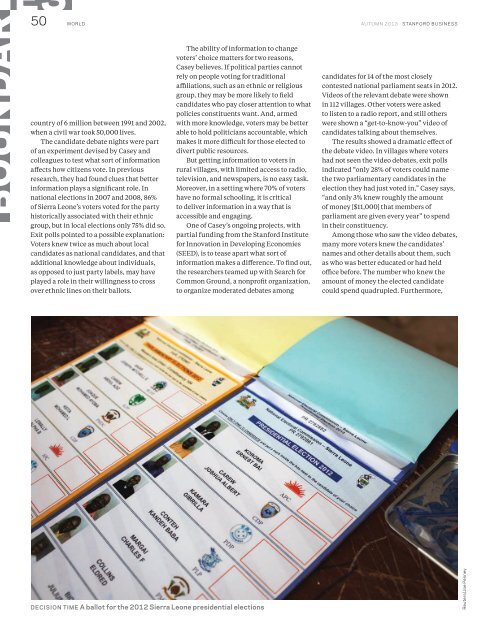Magazine_blue_green
You also want an ePaper? Increase the reach of your titles
YUMPU automatically turns print PDFs into web optimized ePapers that Google loves.
50 WORLD<br />
AUTUMN 2013 STANFORD BUSINESS<br />
country of 6 million between 1991 and 2002,<br />
when a civil war took 50,000 lives.<br />
The candidate debate nights were part<br />
of an experiment devised by Casey and<br />
colleagues to test what sort of information<br />
affects how citizens vote. In previous<br />
research, they had found clues that better<br />
information plays a significant role. In<br />
national elections in 2007 and 2008, 86%<br />
of Sierra Leone’s voters voted for the party<br />
historically associated with their ethnic<br />
group, but in local elections only 75% did so.<br />
Exit polls pointed to a possible explanation:<br />
Voters knew twice as much about local<br />
candidates as national candidates, and that<br />
additional knowledge about individuals,<br />
as opposed to just party labels, may have<br />
played a role in their willingness to cross<br />
over ethnic lines on their ballots.<br />
BOUNDARIES<br />
The ability of information to change<br />
voters’ choice matters for two reasons,<br />
Casey believes. If political parties cannot<br />
rely on people voting for traditional<br />
affiliations, such as an ethnic or religious<br />
group, they may be more likely to field<br />
candidates who pay closer attention to what<br />
policies constituents want. And, armed<br />
with more knowledge, voters may be better<br />
able to hold politicians accountable, which<br />
makes it more difficult for those elected to<br />
divert public resources.<br />
But getting information to voters in<br />
rural villages, with limited access to radio,<br />
television, and newspapers, is no easy task.<br />
Moreover, in a setting where 70% of voters<br />
have no formal schooling, it is critical<br />
to deliver information in a way that is<br />
accessible and engaging.<br />
One of Casey’s ongoing projects, with<br />
partial funding from the Stanford Institute<br />
for Innovation in Developing Economies<br />
(SEED), is to tease apart what sort of<br />
information makes a difference. To find out,<br />
the researchers teamed up with Search for<br />
Common Ground, a nonprofit organization,<br />
to organize moderated debates among<br />
candidates for 14 of the most closely<br />
contested national parliament seats in 2012.<br />
Videos of the relevant debate were shown<br />
in 112 villages. Other voters were asked<br />
to listen to a radio report, and still others<br />
were shown a “get-to-know-you” video of<br />
candidates talking about themselves.<br />
The results showed a dramatic effect of<br />
the debate video. In villages where voters<br />
had not seen the video debates, exit polls<br />
indicated “only 28% of voters could name<br />
the two parliamentary candidates in the<br />
election they had just voted in,” Casey says,<br />
“and only 3% knew roughly the amount<br />
of money [$11,000] that members of<br />
parliament are given every year” to spend<br />
in their constituency.<br />
Among those who saw the video debates,<br />
many more voters knew the candidates’<br />
names and other details about them, such<br />
as who was better educated or had held<br />
office before. The number who knew the<br />
amount of money the elected candidate<br />
could spend quadrupled. Furthermore,<br />
DECISION TIME A ballot for the 2012 Sierra Leone presidential elections<br />
Reuters/Joe Penney


